
Eye Associates of South Texas New Braunfels
Ophthalmologist in New Braunfels, Texas
New Braunfels Eye Surgery Experts
Eye Associates of South Texas in New Braunfels is a state-of-the-art ophthalmology practice dedicated to providing the highest level of healthcare. We specialize in laser-assisted cataract surgery and LASIK surgery, using the best technology and techniques available to deliver outstanding vision correction results to our patients.
We work hand-in-hand with an experienced team of eye surgeons and general ophthalmologists. Dr. Jason Burns and Dr. Joseph Kavanagh perform cataract and refractive surgeries, leveraging decades’ worth of surgical experience to provide the best vision results. Dr. Christina Bui offers comprehensive eye care services, treating common and complex eye conditions.
Cataracts & Cataract Surgery New Braunfels, TX
Cataracts are a clouding of the natural lens in your eye. Common symptoms include cloudy or blurry vision, seeing halos around lights, faded color and double vision.
People develop cataracts as part of the aging process, usually around the age of 40. During the early stages, cataracts can be managed with glasses or contacts. Surgery is usually recommended when cataracts interfere significantly with daily activities, such as reading, driving, or recognizing faces. Surgery is also the only way to restore cataract-impaired vision.
Laser-Assisted Cataract Surgery New Braunfels, TX
Laser-assisted cataract surgery is a modern way to remove cataracts using advanced laser technology. It’s more precise and can offer better results than traditional cataract surgery. This is how it works:
- Laser Precision: A special laser makes exact cuts in your eye, which is more accurate than using a blade. This can lead to a safer procedure and better outcomes.
- Lens Capsule Opening: The laser opens the lens capsule (the outer part of the lens) with great precision, allowing for better removal of the cataract.
- Breaking Up the Cataract: The laser breaks the cloudy lens into smaller pieces, making it easier to remove.
Once the cataract has been removed, a special artificial lens called an intraocular lens (IOL) will be implanted into the eye, replacing the cataract-affected natural lens that was just removed.
The laser-assisted surgery provides several advantages over the standard approach:
- Accuracy: The laser’s precision means less risk of complications and better visual outcomes.
- Customizable: The laser can be adjusted to fit your eye’s exact shape and size, which helps in getting the best results.
- Better for Advanced Lenses: If you are getting special lenses like multifocal or toric lenses, the laser can help place them more accurately.
Intraocular Lenses: Available Options New Braunfels, TX
Choosing the right IOL is a crucial part of cataract surgery. Discuss your options with your eye doctor, considering your lifestyle, vision needs, and budget to make the best choice for your vision and overall quality of life. The following overview of IOLs can help you understand the main differences between them:
Basic Lenses
These lenses are the ones typically covered by insurance. They are monofocal lenses, meaning they provide clear vision at one specific distance, usually far, but you may still need glasses for reading.
Multifocal Lenses
These IOLs offer clear vision at multiple distances, reducing the need for glasses, though they might cause glare or halos and require an adjustment period.
Toric Lenses
Torics are special lenses designed to correct astigmatism, which cataract surgery by itself won’t do.
Light-adjustable Lenses
Light-adjustable Lenses (LALs) allow for post-surgery adjustments to fine-tune your vision, offering precise correction but at a higher cost and requiring multiple follow-up visits. People interested in multifocal lenses but worried about glare or halo can get similar results with these lenses.
LASIK Eye Surgery for Vision Correction in New Braunfels, TX
LASIK (Laser-Assisted In Situ Keratomileusis) eye surgery is a common and effective procedure designed to address common vision problems. If you have nearsightedness (myopia), farsightedness (hyperopia) or astigmatism, LASIK can help you correct your vision and reduce or even eliminate the need for glasses.
The goal of LASIK is to reshape the cornea—the clear front part of the eye—so that light entering the eye is properly focused onto the retina, resulting in clearer vision.
H2 How does LASIK Work?
During LASIK surgery, your eye is numbed with drops, and the surgeon creates a thin flap on your cornea using a tiny blade or a laser. This flap is lifted, and another laser reshapes your cornea to correct your vision. The flap is then put back in place to heal naturally. The whole process takes about 15 minutes per eye, and you’ll likely notice better vision within a day.
If you are interested in LASIK, the first step is determining whether you are a good candidate. Some people are not good candidates for LASIK because of certain eye conditions or health-related factors, but may benefit from alternative procedures that offer similar results.
Not sure if LASIK is right for you?

99% SUCCESS RATE 99% of NVISION patients see 20/20 or better after LASIK

RAPID RECOVERY Resume your normal activities in 24 hours

COMFORT-FOCUSED LASIK is virtually painless and completed in minutes
Eye Associates of South Texas New Braunfels
457 Landa St Suite FNew Braunfels, TX 78130
Mon - Fri: 8 AM - 5 PM
Saturday: 8 AM - 12 PM
Sunday: Closed
Hurry, Offer Ends Soon
Book now for $1,000 off LASIK* + Enjoy Easy and Fast LASIK Financing**
Vision Correction Procedures in New Braunfels
Today's life-changing procedures make it possible to improve your vision to 20/20—or better.
LASIK Eye Surgery
LASIK eye surgery is a safe, highly effective solution to correct vision and eliminate the need for glasses or contacts. At NVISION, our expert surgeons use state-of-the-art technology and advanced techniques to deliver exceptional results and have you back to your routine quickly.
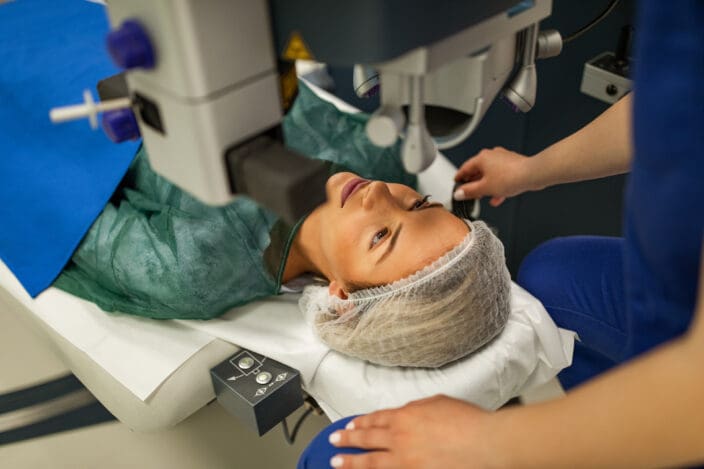
EVO ICL™ (Implantable Collamer Lens)
Say goodbye to glasses and contacts with EVO ICL™! This advanced procedure is an excellent option for patients who aren’t LASIK candidates. By placing a biocompatible lens in your eye—without removing the natural lens—EVO ICL™ corrects nearsightedness and astigmatism, providing clear, long-lasting vision.
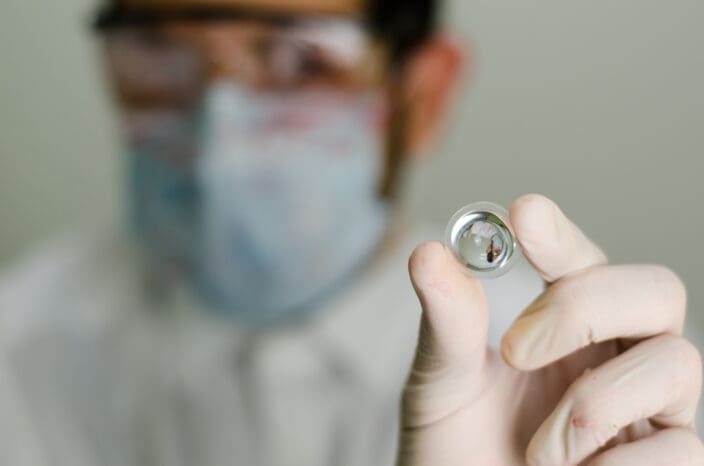
Cataract Surgery
Cloudy vision holding you back? Our advanced cataract surgery, featuring laser-assisted technology and lifestyle lenses, can restore your sight and help you enjoy life’s moments clearly again.
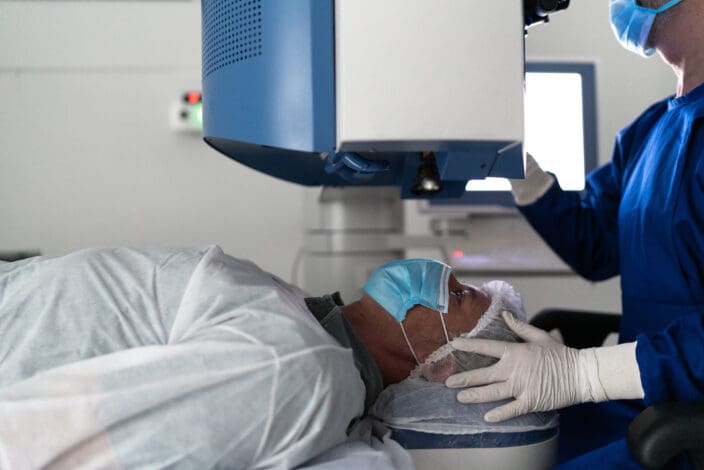
iDose® TR Glaucoma Treatment
iDose® TR is a micro-sized implant that provides a continuous release of glaucoma medication directly inside your eye. This ensures 24/7 eye pressure control – it’s so effective that 8 out of 10 patients don’t need glaucoma drops anymore.
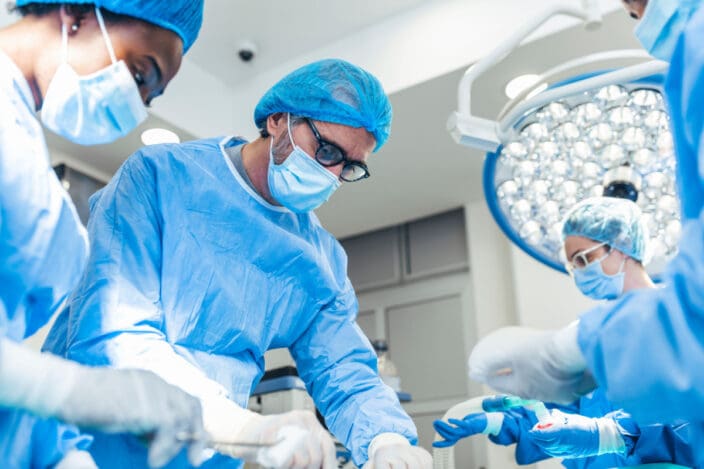
Refractive Lens Exchange (RLE)
Refractive Lens Exchange (RLE) replaces your eye’s natural lens with a clear, artificial one—improving your vision and reducing your dependence on glasses or contacts.
Sometimes called Custom Lens Exchange (or CLE), RLE is popular option for adults over 40 who want to correct nearsightedness, farsightedness, or astigmatism—and it’s a smart, preventative solution before cataracts ever develop.
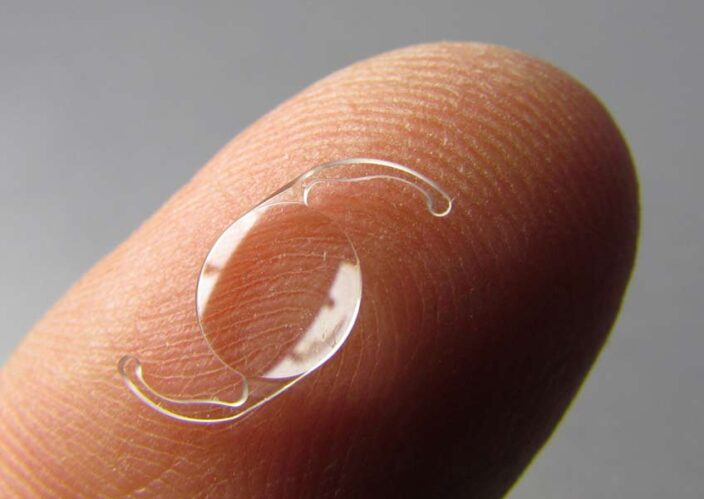
Other Procedures
Lifestyle Lenses
Lifestyle lenses are a premium lens option that offers a more functional range of vision, and are designed to reduce the need for distance and reading glasses.
We offer the latest and most advanced lifestyle lens on the market.
Dry Eye Treatment
Dry eye is an irritating, painful, and common condition in which the eye fails to properly produce quality tears. When left untreated, it may lead to ulcers and scars on the cornea.
Depending on the severity of your condition, there are a variety of treatments to relieve dry eyes.
PRK Surgery (Photorefractive Keratectomy)
What is PRK Surgery?
PRK Surgery (Photorefractive Keratectomy) is a type of laser eye surgery that is used to correct refractive errors such as nearsightedness (myopia), farsightedness (hyperopia), and astigmatism. PRK is an alternative to LASIK eye surgery and is particularly suitable for individuals who may not be candidates for LASIK due to certain corneal characteristics.
Overview of the PRK surgery process:
- Corneal Epithelium Removal:
- In PRK, the surgeon begins by removing the thin outer layer of the cornea called the epithelium. This can be done using an alcohol solution, a special brush, or a laser.
- Laser Reshaping of the Cornea:
- Once the epithelium is removed, a laser is used to precisely reshape the cornea. The laser ablates or removes microscopic amounts of corneal tissue based on the patient’s refractive error. The goal is to correct the curvature of the cornea and improve the focus of light on the retina.
- Healing Process:
- Unlike LASIK, where a corneal flap is created, PRK does not involve creating a flap. Instead, the corneal surface is allowed to regenerate naturally. The healing process involves the growth of new epithelial cells over the treated area.
- Post-operative Care:
- Following PRK surgery, patients are given medicated eye drops to aid in the healing process and prevent infection. Recovery may take a bit longer compared to LASIK, and patients may experience temporary discomfort during the initial days.
Key considerations for PRK surgery include:
- Corneal Thickness: PRK may be a suitable option for individuals with thinner corneas who may not be ideal candidates for LASIK.
- Occupational Considerations: PRK may be recommended for individuals with occupations or lifestyles that carry a risk of corneal injury, as it eliminates the creation of a corneal flap.
- Healing Time: The initial visual recovery may take longer with PRK compared to LASIK. Patients typically experience optimal vision several weeks after the procedure.
PRK is a well-established and effective procedure for vision correction, and its suitability depends on individual factors. It’s important to consult with an experienced refractive surgeon or eye care professional to determine the most appropriate laser eye surgery option based on your eye health and lifestyle.
Laser Blepharoplasty
Laser blepharoplasty eye surgery, also known as laser eyelid surgery, is a surgical procedure to rejuvenate eyelid tissues (skin, muscle, or fat). Blepharoplasty is performed for both cosmetic and vision correction purposes. NVISION has an eye clinic to help address your needs – Book a consultation today.
Minimally Invasive Glaucoma Surgery (MIGS)
Glaucoma is a disease that occurs when pressure from fluid buildup damages the optic nerve. In this advanced glaucoma eye surgery, often called MIGS, fluid drainage is improved with a microscopic stent.
Recommended Reading



We Accept Insurance
At NVISION Eye Centers, we work with many insurance companies to provide the best service possible for each of our patients. Below you will find a list of our current providers for this location. Please call us if you do not see your specific provider, as NVISION frequently adds new insurance companies and offers many out of network options.
- Aetna
- Cigna
- Humana
- Medicare
- AIG Workers Comp
- Amerivantage
- Blue Cross/Blue Shield
- Coventry
- Eye Med
- Guadalupe Healthcare Network
- Healthcare Highway
- Healthsmart
- Health Texas Medical Group
- Independent Medical Systems
- Medical Eye Services
- Medicaid
- Occunet Workers Comp
- OMNI
- PVC
- Railroad Medicare
- Superior Vision Plan
- Three Rivers Provider Network
- United Healthcare
- VSP Vision Care
- WellMed
- Spectera
- VBA
- Avesis
- Community Eye Care
- SafeGuard Vision
- Met Life Vision
Surgeons at Eye Associates of South Texas New Braunfels
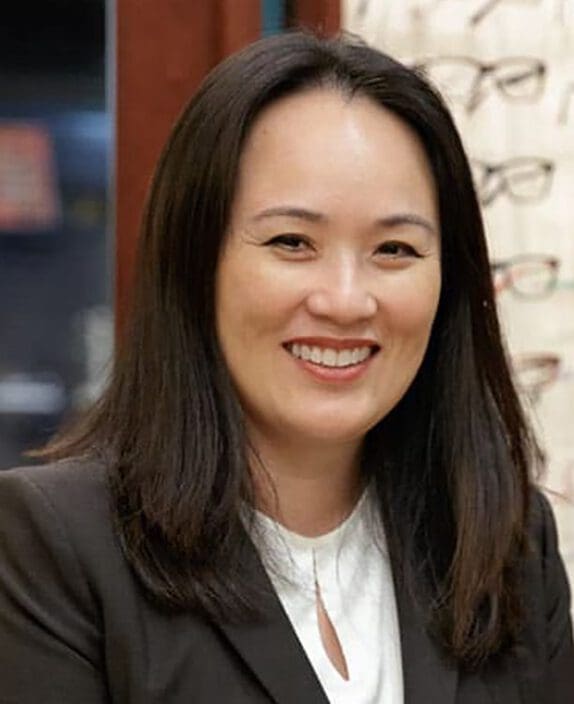
Dr. Bui, a San Antonio native, is a board-certified ophthalmologist focusing on pediatric ophthalmology, neuro-ophthalmology, and the treatment of glaucoma and retina diseases.

Board certified by the American Board of Ophthalmology, Jason Burns, M.D. is a general ophthalmologist who specializes in cataract and refractive surgery.

Dr. Kavanagh is a board-certified ophthalmologist who has been performing refractive surgery for over 20 years. He is also known for his expertise in all aspects of cataract surgery.
At NVISION® Eye Centers, we provide life-changing results, an exceptional experience, and a lifetime commitment to your LASIK vision correction.
- Industry-leading surgeons and vision outcomes with more than 2 million successful procedures
- The most advanced laser and diagnostic technology available
- Financing available – no down payment, zero or low interest, low monthly payments
- Free LASIK consultations
- Use your FSA/HSA balance toward LASIK before it expires in December
Location Information
Eye Associates of South Texas- New Braunfels
457 Landa St # F, New Braunfels, TX 78130
(830) 627-7327



